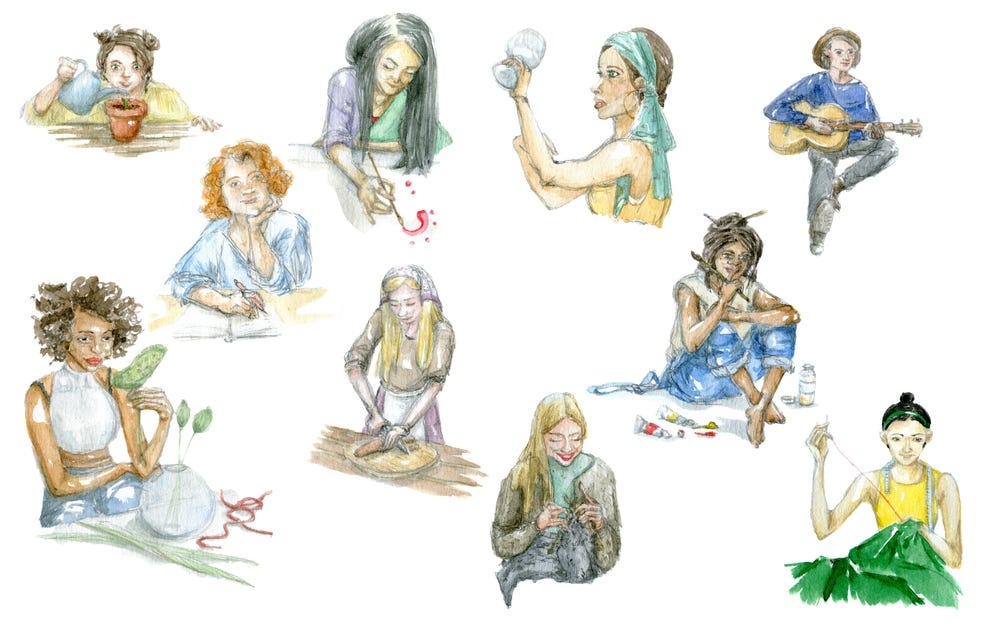
The writer’s code (written into our secret writer club rules) reminds us that day jobs (and only day jobs) stand between us and a published novel.
I believed.
Thanks for reading Brooklyn Girl Books (etc.)! Subscribe for free to receive new posts and support my work.
Subscribed
For years I thought, if only and when and someday. And yes, working one, two (and sometimes three) jobs at a time took a big bite out of what would have surely been my fast track to a Pulitzer. But, in the end, ‘twas the slogging through, learning from, loving, and hating the ridiculous number of jobs I worked that brought my novels to life.
The bosses I despised (especially them,) the coworkers who became family, the ones who turned my stomach, those I supervised, fired, hired, and found cheating, using drugs, and selling drugs gave me worlds for which I only needed to find words.
The clients. The patrons.
Here’s to all of them:
Bartending: This is my top choice of jobs writers should all have in their past. In my thirties, I worked for four years at Winnie’s Pub in Mission Hill, where I received a doctorate in men, alcoholism, racial politics, class, sexual politics, and sexual harassment.
In vino, veritas, baby (or, a drunk man speaks a sober man’s mind) and the truth often sucked, such as being told by a very high-up member of a local police force, “I’ve never slept with a Jewish woman, and I think it’s time.”
Ah, the romance of being wanted to round out someone’s cultural/religious romance resume.
Other nuggets learned at Winnie’s Pub:
* Yes, there is such a thing as live sex at bachelor parties (held across the street at a veteran’s post). Enough said.
* Sad numbers of women and men, when drunk enough, will go home with almost anyone. Trying to talk said women (in sisterhood) out of these choices does not work.
* When drunk, huge men will attempt to frighten tiny women.
* When drunk, tiny men will attempt to protect tiny women from huge drunk men.
* Drunken men and women are bores.
* When drunk and feeling safe, men and women will use awful words to describe members of other cultures. These same people will act like good buddies when members of the other culture enter. These same people will also believe a bartender when she claims her father is: African-American, Japanese, Korean, Hispanic, Italian, and Muslim.
* And there are kind & funny people at bars, men and women who come out of their shells in a good way—occasionally there are Cheers moments.

Three (blessedly) short college jobs made a huge impression:
- Making subs at Blimpie Restaurant taught me when you walk out of a fast-food restaurant, after 8 hours, you carry that smell with you forever.
- Folding pajamas and placing straight pins at the seams (for one day) made me forever realize I was blessed (as I could quit that job) and that the clock could move backward.
- Twisting sheets into ropes, tying them off with rubber bands, and dipping them into vats of boiling dye (in the Lower East Side) broke any illusions I held that counter-culture factory work (to make tye-dye for the masses) was more benign than any other factory. Political lessons are all over the place.
Some lessons I learned working for the City of Boston I wish I could erase. Ah, for the days of innocence. While many employees were dedicated and committed, others spent vast sums of time and money on self-indulgence and political purposes. Some treated the city’s coffers, the treasures of the city, and the people they serve like toys and puppets.
And I found true heroes walking & working the street of Boston.
Running a community center, I learned that local sports (basketball!) are intense enough to grab even the guts of a sports moron like myself (who wept when her team won the city-wide championship.) I’d never understood sports fervor without that job.
Nor would I have a clue about gym rules, daycare environments, weeping teachers wandering the halls, and how much guts it takes to fire someone.
I loved that job, so I learned what it means to love what you do and have to leave because you need more money. And then, I learned why managers in central offices get paid more than those in the field. Because the decisions are made in the central office. Yup. That’s it.

Working at Barton’s candy counter in San Francisco, I learned that it takes very little time to get sick of eating candy. And that despite being sick of it, being bored will drive you to keep on shoving it in your mouth. And that sweet leads to salty to sweet and back again.
Babysitting (sorry, all of you guys who let me into your homes when I was a teenager) taught me that very average-looking folks have porn stashed under their beds and pills in their cabinets.
Being a waitress meant knowing for the rest of my life what it means to be invisible.
Being a supermarket cashier taught me about absorbing anger and sadness.
Working as a camp counselor at Camp Mikan helped me understand why one can trust one’s children with other folks. Because I loved those kids to pieces. Best job.
Working with men ordered to Batterer Intervention Treatment (men who’d been found guilty of domestic violence) taught me more than I wanted to know and so much I wish I had known earlier. Most importantly, I learned change is possible.

I remember twenty-six jobs. I know there are others.
They all gave me material, taught me humanity, or illuminated inhumanity and
I can’t regret one.
Manager for City Agency
Camp Counselor
Tutor
Fast Food Worker
Factory Folder
Factory Twister
Wall Street Coder
Insurance Paper Pusher
Encyclopedia Salesperson (door-to-door)
Writing Teacher
Candy Counter Salesperson
Department Store Salesperson
Counter Culture Non-Profit Bookkeeper
Waitress
Writer
Bartender
Pregnancy-Post Partum Group Counselor
Community Center Director
Camp Director
After School Director
Assistant Director of Batterer Intervention Program
Grant Writer
Violence Prevention Group Facilitator
Supermarket Cashier
Mother